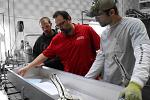- FMA
- The Fabricator
- FABTECH
- Canadian Metalworking
Categories
- Additive Manufacturing
- Aluminum Welding
- Arc Welding
- Assembly and Joining
- Automation and Robotics
- Bending and Forming
- Consumables
- Cutting and Weld Prep
- Electric Vehicles
- En Español
- Finishing
- Hydroforming
- Laser Cutting
- Laser Welding
- Machining
- Manufacturing Software
- Materials Handling
- Metals/Materials
- Oxyfuel Cutting
- Plasma Cutting
- Power Tools
- Punching and Other Holemaking
- Roll Forming
- Safety
- Sawing
- Shearing
- Shop Management
- Testing and Measuring
- Tube and Pipe Fabrication
- Tube and Pipe Production
- Waterjet Cutting
Industry Directory
Webcasts
Podcasts
FAB 40
Advertise
Subscribe
Account Login
Search
"Fabricating industry continues to show its mettle," says association president
- October 7, 2011
- News Release
- Shop Management
The current decade promises to be one of the most exciting periods in recent memory for the metal fabricating and forming industry, according to Ed Youdell, president and CEO of Fabricators & Manufacturers Association Intl. (FMA), Rockford, Ill.
In a recent feature article, Youdell credited new technology, the growing popularity of green manufacturing practices, and the role of manufacturing in pulling the U.S. out of the Great Recession for the metal fabricating industry’s bright future.
"In 2010 there were more jobs added in manufacturing than were lost — 130,000 — the first time this has happened since 1997," Youdell commented. "We will continue to see the sector grow thanks to the need to rebuild inventory and the strength of expanded exports." Youdell cited FMA’s economic analyst Dr. Chris Kuehl in noting that small and medium-size manufacturers, on average, do about 30 percent of their business in global markets, a marked difference from 10 or 15 years ago.
"In addition, the outsourcing of work, one of the economic maladies that plagued the U.S. economy for years, is starting to fade due to logistics, costs, and quality issues. Rapidly increasing labor rates in developing economies, fuel and transportation costs, and raw material prices are starting to diminish the benefits of outsourcing, so work is coming back to the U.S," said Youdell.
Another explanation for manufacturing's bright future is the way the sector has aggressively adapted to new business environments. "Manufacturers are much more capital-intensive and rely more on technology to stay competitive. Technology enables them to produce quality products with significantly more efficiency. Even though workforce numbers have dropped over the last few decades, productivity numbers have risen every year," Youdell explained.
"What's also encouraging for our industry is growing recognition among its top executives of the importance of green energy practices in manufacturing applications," he continued. "A 2011 study by the Material Handling Industry of America revealed a whopping nine in 10 executives surveyed say their companies believe that sustainable initiatives have the potential to save both money and resources. Anytime a business can reduce costs, enhance profits, and conserve resources, it’s a win-win."
Green manufacturing is growing in importance with other groups as well. The new E3 (Economy, Energy, and Environment) Initiative is a coordinated federal and local technical assistance effort that provides manufacturers with customized assessments of production processes and assists with the implementation of energy-saving projects.
Showcasing how to leverage this opportunity to help both the earth and the bottom line is Green Manufacturer®, launched by FMA in 2010. "It highlights sustainable manufacturing processes, green products, and green applications and educates companies on the best ways to invest and become greener," said Youdell. "We're really proud that Green Manufacturer recently won the Gold Medal award from the American Society of Business Publication Editors (ASBPE) for best new magazine of 2010."
FMA frequently addresses green and general manufacturing issues in seminars and events, through tradeshows such as FABTECH®, and via numerous magazines targeting the metal fabricating industry.
Youdell cautioned, however, that the industry faces a serious challenge in the shrinking availability of skilled labor.
"For many, a labor shortage in an uncertain economy is counterintuitive. Yet, survey after survey reveals companies have such positions unfilled."
Youdell cited manufacturing's image as being dark, dangerous, and nonchallenging as one problem to be overcome. "The reality today is quite different. One finds manufacturing facilities that are bright, clean, and without endless production lines. They are reliant instead on sophisticated equipment and the newest generation of computer technology," he explained.
"Also, U.S. education priorities did not position manufacturing as a preferred career choice. Vocational programs and shop classes have been dropped due to budget constraints and liability concerns, and a greater emphasis placed on preparing students for a traditional four-year university academic track. And for too long the manufacturing industry itself has not been proactive to combat the problem," he said.
Youdell noted that FMA is working to change this landscape by funding summer manufacturing camps for young people and offering college scholarships for students preparing for careers in the industry. Other groups, including the Gold Collar Careers Initiative in Wisconsin, the Chicago Manufacturing Renaissance Council, and The Manufacturing Institute, also are leading similar movements.
"Educational systems are starting to realize the need to offer a vocational or technical educational track — even if it means a collaborative program, and more companies today are reviving apprenticeships and in-house training programs. We hope that these efforts will convince young people that manufacturing jobs are rewarding and fulfilling."
FMA is a professional organization with nearly 2,300 members working together to improve the metal forming and fabricating industry.
Related Companies
subscribe now

The Fabricator is North America's leading magazine for the metal forming and fabricating industry. The magazine delivers the news, technical articles, and case histories that enable fabricators to do their jobs more efficiently. The Fabricator has served the industry since 1970.
start your free subscription- Stay connected from anywhere

Easily access valuable industry resources now with full access to the digital edition of The Fabricator.

Easily access valuable industry resources now with full access to the digital edition of The Welder.

Easily access valuable industry resources now with full access to the digital edition of The Tube and Pipe Journal.
- Podcasting
- Podcast:
- The Fabricator Podcast
- Published:
- 04/16/2024
- Running Time:
- 63:29
In this episode of The Fabricator Podcast, Caleb Chamberlain, co-founder and CEO of OSH Cut, discusses his company’s...
- Industry Events
16th Annual Safety Conference
- April 30 - May 1, 2024
- Elgin,
Pipe and Tube Conference
- May 21 - 22, 2024
- Omaha, NE
World-Class Roll Forming Workshop
- June 5 - 6, 2024
- Louisville, KY
Advanced Laser Application Workshop
- June 25 - 27, 2024
- Novi, MI






























